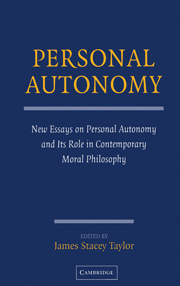Book contents
- Frontmatter
- Contents
- List of Contributors
- Acknowledgments
- Introduction
- PART I THEORETICAL APPROACHES TO PERSONAL AUTONOMY
- PART II AUTONOMY, FREEDOM, AND MORAL RESPONSIBILITY
- 8 Autonomy and Free Agency
- 9 The Relationship between Autonomous and Morally Responsible Agency
- 10 Alternative Possibilities, Personal Autonomy, and Moral Responsibility
- 11 Freedom within Reason
- PART III THE EXPANDING ROLE OF PERSONAL AUTONOMY
- Index
8 - Autonomy and Free Agency
Published online by Cambridge University Press: 03 December 2009
- Frontmatter
- Contents
- List of Contributors
- Acknowledgments
- Introduction
- PART I THEORETICAL APPROACHES TO PERSONAL AUTONOMY
- PART II AUTONOMY, FREEDOM, AND MORAL RESPONSIBILITY
- 8 Autonomy and Free Agency
- 9 The Relationship between Autonomous and Morally Responsible Agency
- 10 Alternative Possibilities, Personal Autonomy, and Moral Responsibility
- 11 Freedom within Reason
- PART III THE EXPANDING ROLE OF PERSONAL AUTONOMY
- Index
Summary
INTRODUCTION
In this chapter, I want to explore questions about the kind of freedom personal or agential autonomy is said to require. In particular, I want to address: (1) our ordinary pretheoretical intuitions about autonomy; (2) whether autonomy demands freedom to do otherwise, an issue of concern to philosophers who regard autonomous agency as central to responsible agency; (3) whether autonomy is guaranteed by the satisfaction of positive and negative freedom; and (4) the sense in which autonomy requires the freedom to “create oneself.” I will begin by offering a brief examination of the concept of autonomy at issue. In Section II, I will explore the question of whether personal autonomy is a phenomenon that depends upon the resolution of our metaphysical status relative to the truth or falsity of determinism. Section III will take up the question of positive and negative freedom, while the issue of self-creation will be the subject matter of Section IV.
THE CONCEPT OF AUTONOMY
Autonomy literally means “self-law” or “self-rule,” and an autonomous person is one who directs or determines the course of her own life. Having a right to autonomy, or de jure autonomy, will not suffice for actual self-rule. Although a person's behavior and motivations can be traced to a variety of factors, to describe a person as autonomous is to claim that the person exercises de facto control over the choices and actions relevant to the direction of her life. This calls for agential power and authority in the form of psychological freedom – mastery of one's will – as well as power and authority within central social roles and arrangements. One component of agential power and authority is self-control.
- Type
- Chapter
- Information
- Personal AutonomyNew Essays on Personal Autonomy and its Role in Contemporary Moral Philosophy, pp. 183 - 204Publisher: Cambridge University PressPrint publication year: 2005
- 5
- Cited by



